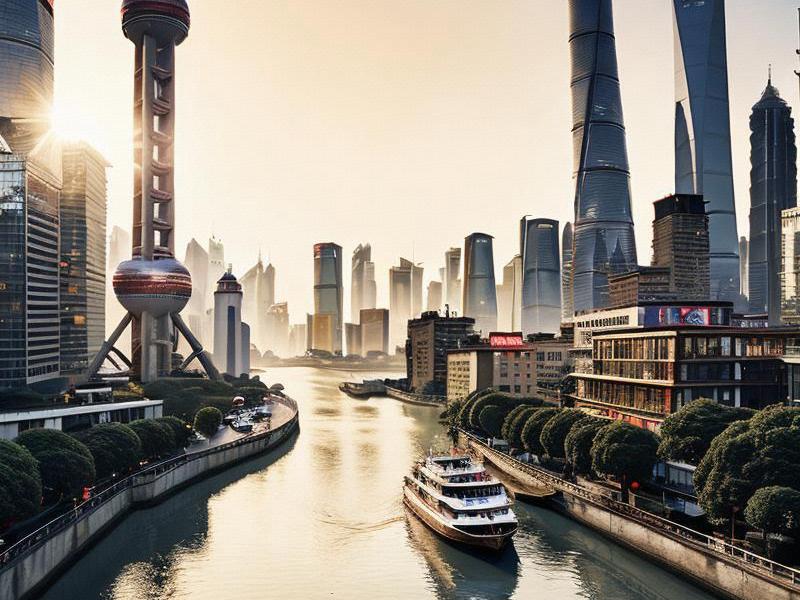
Shanghai, a city that has long been a symbol of China's economic and cultural evolution, stands as a testament to the nation's remarkable transformation over the past century. Once a modest fishing village, Shanghai has risen to prominence as one of the world's most dynamic and influential cities, embodying the spirit of modernization and cultural revival.
The city's journey from a sleepy port town to a bustling metropolis is nothing short of extraordinary. In the late 19th and early 20th centuries, Shanghai became a haven for international trade and commerce, attracting merchants and adventurers from around the globe. This period of rapid growth laid the foundation for the city's cosmopolitan character and its reputation as the "Paris of the East."
Today, Shanghai is a global financial hub, home to the world's busiest container port and a leading center for commerce, finance, and technology. The city's skyline is a marvel of modern architecture, with iconic landmarks such as the Oriental Pearl Tower, the Shanghai Tower, and the Jin Mao Tower standing as symbols of its economic prowess. These structures, along with the futuristic Pudong district, showcase Shanghai's commitment to innovation and its ability to seamlessly integrate cutting-edge design with urban development.
However, Shanghai's story is not solely one of economic growth and architectural marvels. The city has also made significant strides in preserving and reviving its rich cultural heritage. The Bund, a historic waterfront area, offers a glimpse into the city's colonial past, with its neoclassical buildings and cobblestone streets. In contrast, the nearby Yu Garden, a classical Chinese garden, provides a serene escape into the traditions of old Shanghai.
爱上海最新论坛 The blending of old and new is a defining characteristic of Shanghai, and this harmony is evident in the city's vibrant cultural scene. Shanghai is home to numerous museums, galleries, theaters, and music venues, attracting artists, musicians, and performers from around the world. The city's art scene is particularly noteworthy, with the M50 Creative Park and the Power Station of Art serving as hubs for contemporary art and culture.
One of the most striking aspects of Shanghai's cultural revival is its culinary scene. The city boasts a diverse array of dining options, from traditional Shanghainese cuisine to international flavors. Pudong's Lujiazui area is a food lover's paradise, offering everything from Michelin-starred restaurants to bustling night markets. The city's culinary traditions, such as xiaolongbao (soup dumplings) and shengjianbao (pan-fried buns), have gained international acclaim, reflecting the city's ability to preserve its heritage while embracing modernity.
Shanghai's educational and research institutions also play a crucial role in the city's cultural and intellectual revival. Renowned universities such as Fudan University and Tongji University attract students and scholars from around the world, fostering a vibrant academic community. The city's research facilities and innovation hubs are at the forefront of technological advancements, driving Shanghai's position as a global leader in science and technology.
The city's commitment to sustainability and environmental protection is another aspect of its modern transformation. Shanghai has implemented various initiatives to reduce pollution, promote green energy, and enhance urban living conditions. The city's extensive public transportation network, including the world's first maglev train, exemplifies its efforts to provide efficient and eco-friendly mobility options for its residents.
上海龙凤419社区 Shanghai's transformation is not without its challenges. The rapid pace of urbanization has led to issues such as housing shortages, traffic congestion, and environmental concerns. However, the city has demonstrated remarkable resilience and adaptability in addressing these challenges. Initiatives such as the construction of new housing developments, the expansion of public transportation, and the promotion of green spaces are helping to crteeaa more sustainable and livable city.
The people of Shanghai are at the heart of the city's transformation. The city's diverse population, including native Shanghainese and immigrants from all over China and the world, contributes to its rich cultural tapestry. The locals' entrepreneurial spirit, coupled with their passion for preserving tradition, is a driving force behind Shanghai's success.
Shanghai's international connections and role on the global stage further highlight its significance. The city has established itself as a key player in international trade, finance, and diplomacy. Its free trade zone, established in 2013, has attracted numerous multinational corporations and foreign investors, solidifying Shanghai's position as a gateway to China.
爱上海 The city's cultural diplomacy efforts are also noteworthy. Shanghai has hosted numerous international events, including the World Expo in 2010, which drew millions of visitors from around the world. These events not only showcase the city's achievements but also foster cultural exchange and understanding on a global scale.
Looking ahead, Shanghai's future is bright and full of promise. The city continues to evolve, balancing its rapid modernization with the preservation of its rich cultural heritage. As Shanghai looks to the future, it remains committed to innovation, sustainability, and cultural revival, ensuring that it remains a beacon of progress and a symbol of China's enduring spirit.
In conclusion, Shanghai's journey from a historic port city to a global metropolis is a story of remarkable transformation and cultural revival. The city's rapid modernization, coupled with its commitment to preserving and reviving its rich heritage, makes it a unique and dynamic place that continues to captivate the world. As Shanghai looks to the future, it remains a symbol of China's enduring spirit and a testament to the power of urban development and cultural revival.
